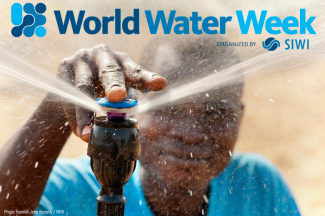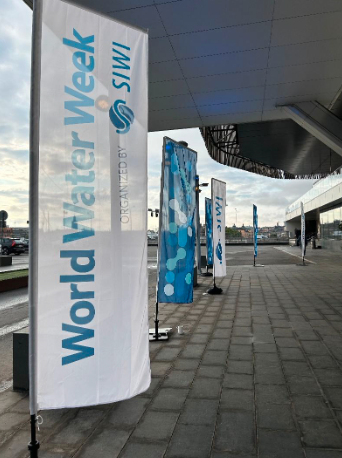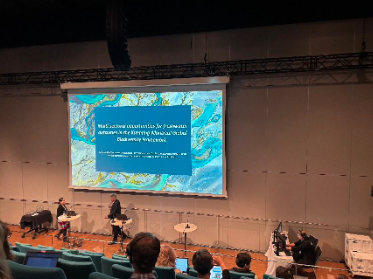Global Problems, Local Solutions: An MES Student’s Takeaways from World Water Week 2023

Late this summer I had the privilege of being able to attend and volunteer at World Water Week (WWW) in Stockholm, Sweden. Hosted every year since 1991, WWW has become a gathering of non-profit, government, and private organizations throughout the world. It is hosted by the Stockholm International Water Institute (SIWI) and the esteemed Stockholm Water Prize and Junior Stockholm Water Prize are presented by the king and princess during the week. I was able to gleam two different perspectives on the conference through the lenses of both a volunteer and an attendee.
 As a volunteer I, along with some sixty other individuals from around the world, were tasked with either specific rooms or services that needed assistance during the event. Much of the event consisted of seminar series that would run throughout the day. These seminars were designed to piggyback off the year’s theme of innovation and present how organizations have either innovated in the past or how they will in the future. In my role as a volunteer, I worked with the session hosts and speakers to ensure that presentations ran smoothly. This allowed me to interact with people in high-level positions in both regional and global institutions, including the Minister of Water of Egypt and several leaders from the World Resources Institute (WRI), World Bank, and United Nations Water to name a few. It was through these interactions that I came to learn how important titles and positions are in other places in the world. They carry a weight that I was not used to in the United States and the people were proud to have these titles and others were proud to interact with those individuals. It was also through my position as a volunteer that I was able to meet people with similar backgrounds from around the world. My fellow volunteers were nearly all master students studying in some sort of water sector. They were from India, England, Sweden, Canada, Germany, Netherlands, and many more countries. Meeting those with similar interests but different backgrounds from myself allowed me to understand several issues on a global scale.
As a volunteer I, along with some sixty other individuals from around the world, were tasked with either specific rooms or services that needed assistance during the event. Much of the event consisted of seminar series that would run throughout the day. These seminars were designed to piggyback off the year’s theme of innovation and present how organizations have either innovated in the past or how they will in the future. In my role as a volunteer, I worked with the session hosts and speakers to ensure that presentations ran smoothly. This allowed me to interact with people in high-level positions in both regional and global institutions, including the Minister of Water of Egypt and several leaders from the World Resources Institute (WRI), World Bank, and United Nations Water to name a few. It was through these interactions that I came to learn how important titles and positions are in other places in the world. They carry a weight that I was not used to in the United States and the people were proud to have these titles and others were proud to interact with those individuals. It was also through my position as a volunteer that I was able to meet people with similar backgrounds from around the world. My fellow volunteers were nearly all master students studying in some sort of water sector. They were from India, England, Sweden, Canada, Germany, Netherlands, and many more countries. Meeting those with similar interests but different backgrounds from myself allowed me to understand several issues on a global scale.
The second lens I was able to look through was that of a full attendee. As I volunteered half the week, the other half I was free to attend as many sessions as I pleased. These sessions were incredibly interesting. I was able to glean how important water availability and cleanliness is in so many places throughout the world. I was also able to see first-hand how water could be a source of tension and conflict. In the United States we are very fortunate that the major rivers and waterbodies which we rely on are located within the country’s jurisdiction. At worst, such as in the Western United States, there is conflict between states. This, however, is not the same as conflict between nations. The damming and diversion of major rivers upstream in upstream countries can cause the countries downstream to face increasingly difficult water availability issues. This sector of transboundary water management and cooperation is of paramount importance and is one of the main reasons which water is cited as a future cause of military conflict in the future. With these issues there were several seminars that highlighted case studies on how certain regions were able to come to an agreement on water sharing and usage. However, there is still a long way to go to achieve acceptable solutions in many regions.

Throughout the conference I could feel an increasing sense of impatience and frustration. There were several instances where I overheard members of the audience voicing their frustrations, privately, on how the presentation was just defining another problem. I get this point. The first step to finding any solution is realizing that there is a problem. This is important. However, I also understand the frustration. The conference was supposed to be based around innovation and how the different sectors of the world can create lasting and positive change. This is not to say that other seminars did not present solutions, it was just showing how driven those who attended were. Everyone understood how imperative it is to do something, and to do something fast. Many had been to conferences such as this for years and they were, understandably, tired of empty promises and agreements that were nothing but show for headlines.
This brings me to my last major point of what I learned at the conference: change takes time. One institution that has great pull and resources in the global sphere is the World Bank. One of the representatives from the World Bank stated something that surprised me. He said that the World Bank is prioritizing projects that they know will need investment and heavy involvement for seven to ten years. To have such a large organization state that their projects took almost a decade to complete really opened my eyes. There are countless nuances and boxes to check for anything that happens at a large scale, especially between nations. Getting people to the table is hard enough, keeping them there long enough to effect change is another battle entirely.
My experience at World Water Week in Stockholm was one that both exhausted and enlightened me. It made me feel more confident and hopeful that there were so many people from around the world that wanted to unite around solving our water issues. However, the amount of problems that need to be addressed is ever-increasing and ever-changing. To solve them we will need more people like those at the conference - and those not in attendance too - to invest time, money, and pride in finding lasting solutions for the world’s most precious resource.
- Water Leadership
- Community Capacity Building & Water Equity
- Integrated Watershed Planning & Governance

